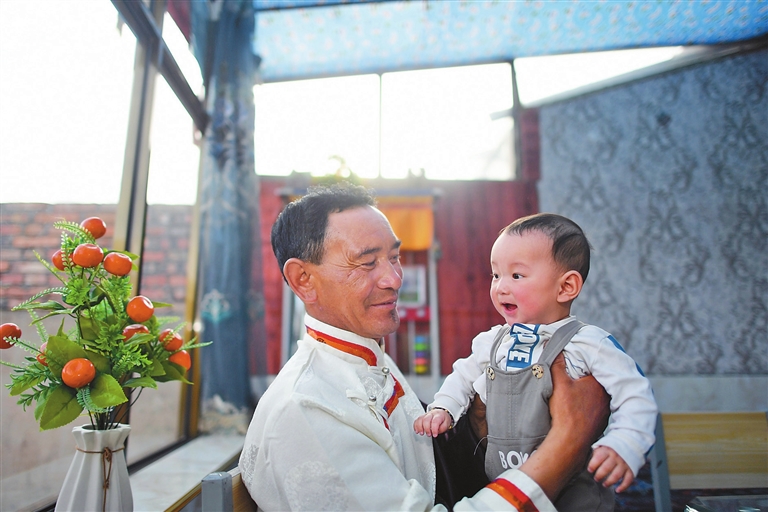


AT an altitude of 3,300 meters, Sonam Tsering offered a hada, a traditional Tibetan silk scarf that symbolizes purity and auspiciousness, to a guest who had come from afar — Xi Jinping, general secretary of the Communist Party of China (CPC) Central Committee. The Tibetan herdsman, whose family previously struggled to make ends meet in a mountainous rural village in Northwest China’s Qinghai Province, now owns 80 sheep and 20 cattle thanks to poverty-alleviation subsidies and loans from the government. Sonam Tsering, who had bid farewell to his former home, a dilapidated adobe structure surrounded by uneven stone walls, welcomed Xi outside his new house that is equipped with a flush toilet and a driveway that leads up to the front door. “Thanks to the Party’s favorable policies, the lives of us herders are getting better every day,” Sonam Tsering said. The visit of Xi came less than a month before the world’s largest Marxist party, which has seen its membership explode from 50-plus individuals to more than 91 million, celebrates its centennial. Over the past century, the Party has transformed the once shattered and impoverished country into the world’s second-largest economy. The CPC has led China to achieve miracles of rapid economic growth and long-term social stability, which has had profound global implications. Western political theories fall short in explaining the CPC’s success. For a party that has remained committed to serving the people, the country’s 1.4 billion citizens are an inexhaustible source of strength. A Party of 'our own' The CPC is substantially different from Western-style political parties. In a nutshell, it is viewed by the Chinese people as “a party of our own.” Born in the early 20th century, a period when the downtrodden Chinese people were struggling against foreign invasions and internal divisions, the CPC established its original aspiration and mission — to seek happiness for the Chinese people and rejuvenation for the Chinese nation. The Party has been translating the needs of the people into concrete actions ever since. This spirit of sacrifice has been carried forward by Chinese Communists in the country’s latest efforts to battle both extreme poverty and the COVID-19 epidemic. More than 39 million CPC members and cadres fought against COVID-19 on the front lines, of whom nearly 400 lost their lives, according to official figures. From 1949 to 2019, China’s per capita disposable income grew at an average annual rate of 6.1 percent in real terms. Xi repeatedly stressed that “the people’s aspiration for a better life is our goal.” “No matter where our Party cadres are, they will always ask the villagers ‘What kind of good life do you expect to have?’” Xi said during his tour of Qinghai. “Let’s work together for a better life.” Issues related to people’s well-being, including employment, income distribution, education, social security, medical care, housing, elderly care, childcare and food safety, all weigh heavily on Xi’s mind. Inseparable, invincible In the 1930s, Edgar Snow visited Yan’an, then the center of the Chinese Communist revolution, where the American journalist found “a rocklike solidarity” among the people of the region led by the CPC. The Red Army, though ragged and poorly armed, had a charm that made them invincible. The unity between the people and the Party observed by Snow has remained unbreakable. In old times, people volunteered to provide food to the revolutionary soldiers and even dismantled their own wooden doors to make stretchers for the fallen. In the fight against COVID-19, hundreds of millions of Chinese citizens have responded to the call of the Party and the government to quarantine themselves to prevent the spread of the virus. The engines of the “world’s factory” have been roaring and the country’s daily mask production capacity rapidly exceeded 100 million. The Chinese people recognize the good governance of the CPC in their own ways: People raised red banners to express their gratitude to earthquake rescuers; children stood on tiptoe to offer water to flood fighters; octogenarians bowed to anti-epidemic medical convoys; villagers in Xinjiang Uygur Autonomous Region presented flowers to cadres who had helped them eradicate extreme poverty. A report from Harvard University in 2020 showed that the Chinese people’s overall satisfaction with the government exceeded 93 percent. The Party, which believes that China has no need for the model of democracy found in the West, has established a democracy that suits the country itself. Never-ending self-improvement Over the past century, the Party has constantly adapted to the changing circumstances with policy changes — one latest such shift being China’s adoption of the three-child policy to improve the demographic structure of the world’s most populous country. But one thing that remains unchanged is the CPC’s bond with the Chinese people, a relationship often described as being as “inseparable as fish and water.” The Party sees corruption as the “greatest threat” to its survival and its relationship with the Chinese people. In recent years, the CPC’s anti-graft watchdog has ousted corrupt officials all the way from low-level “flies” to high-ranking “tigers.” The Party not only ensures it remains principled and professional but also guarantees it stands on the cutting edge of the times. At the launch meeting of a recent campaign on Party history learning and education, Xi stressed the importance of maintaining the Party’s tight bond with the people. The campaign was the latest of the CPC’s efforts to unify its members’ thought, enhance discipline and boost their morale as they march ever forward. While a century of glory has been recorded in the annals of history, the CPC stands ready to write a new chapter for the people and by the people. (Xinhua) | 
